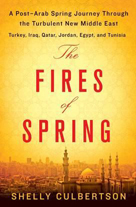The Fires of Spring: A Post-Arab Spring Journey through the
Turbulent New Middle East
Shelly Culbertson, the RAND Corporation
Co-hosted by the Embassy of Slovenia
Photos | Blog Post
 Washington, DC—On July 12, 2016, Shelly Culbertson, policy analyst at the RAND Corporation and author of The Fires of Spring, spoke to WFPG members and guests about the aftermath of the Arab Spring and her observations during her year-long travels in the region. She highlighted three trends that are reshaping the Middle East: new experiments in governance and accountability, the evolving role of women, and an Islamic identity crisis. These transformations, which she defines as Phase II of the Arab Spring, are a sign that the Arab Spring is far from over. The event was held at the Embassy of Slovenia and was moderated by WFPG President Patricia Ellis.
Culbertson’s analysis of the Arab Spring focused on six distinct countries—Turkey, Qatar, Jordan, Iraq, Egypt, and Tunisia—due to their unique roles and significance during the uprisings. In Culbertson’s view, the Arab Spring was a mass societal rejection of the political systems that were established following the collapse of the Ottoman Empire. Thus, Turkey provides an important historical context to help understand the Arab Spring. Culbertson highlighted Tunisia, where the uprisings began, as a potential model for the Middle East. However, she also reminded guests of both recent terrorist attacks and the increasing number of ISIS recruits coming from the country, including women. Egypt, home to a quarter of the Arab population, has been widely regarded as the failure of the movement. Conversely, Jordan’s leadership avoided a violent revolution by meeting modest societal demands with incremental reforms. Qatar provided important coverage of the Arab Spring, via Al-Jazeera, while also funding violent factions in Iraq and Syria. Iraq did not have an Arab Spring, but has been directly affected by ISIS, a “cancerous outgrowth” of the movement.
Culbertson went on to address each of the three transformations that are reshaping the Middle East, beginning with new experiments in governance. Widespread fear of civil war has held the governments in the region accountable to societal concerns, such as in Tunisia and Egypt. Following the toppling of Ben Ali, Tunisia responded to civil demands by adopting a new constitution that combined both secularist and Islamist ideals, and increased women’s rights. Similarly, since its two revolutions, Egypt has also implemented a new constitution, which includes presidential term limits. Culbertson added that as a result of the Arab Spring, Egypt has experienced human change—“Egyptians proved that [they] exists.”
Two additional transformations are the shifting roles of women and an Islamic identity crisis. Culbertson emphasized that women are “defining their own version of modernity” and much of this is a result of the uprisings. The Arab Spring provided women with a platform to use their voices and gain active roles in leadership. Culbertson used the example of Mervat Talawi, an Egyptian women who was responsible for the inclusion of a notable equal rights clause in Egypt’s new constitution. Debates over the compatibility of democracy and Islam have resulted in the third transformation, an Islamic identity crisis. Opposing views of what role Islam should play in governance has factored into some of the current conditions in the region. Culbertson used Tunisia and ISIS as two diametrically opposed examples. The first adopted a new constitution that balances Islamic ideals with democratic values, while the other is determined to establish a new caliphate. Finding an equilibrium point in this debate will be contingent upon the region gaining a better understanding of how Islam fits in government.
Culbertson expressed cautious optimism about moving forward in what will be the second phase of the Arab Spring. She reiterated that while profound change is currently underway, it is still widely unknown how these changes will translate into institutions.
|
|